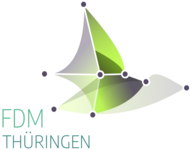- Official Instagram account of the Bauhaus-Universität Weimar
- Official LinkedIn account of the Bauhaus-Universität Weimar
- Official Vimeo channel of the Bauhaus-Universität Weimar

Research Data Management refers to all measures necessary to make digital research data permanently usable. Research data refers to data generated, collected, processed, or analyzed during the scientific and artistic research process. This also includes research results and, if necessary, tools or procedures that have emerged during the research process. In general, research data can be classified by 1) having a structure (text sections, diagrams, tables, etc.) and 2) providing added value for other researchers.
On February 12, 2020, the Bauhaus-Universität Weimar adopted the »Guidelines for Handling Research Data« followed by the »Recommendations for Handling Research Data« on October 13, 2021. Both documents serve as guidelines and assistance, building on the guidelines and the code for ensuring good scientific practice by the German Research Foundation. Additionally, the Research Data Management Contact Point at Bauhaus-Universität Weimar is happy to assist with typical inquiries, such as:
- Storage, organization, and publication of research data (FAIR principles, 5S Data, 3-2-1-0 Backup Rules, etc.)
- Feedback on RDM sections in project proposals (Data Management Plan)
- Handling of personal data (1st level support regarding data protection)
Organized Workshops
Here is a list of workshops on the topic of research data management that have been offered over the years. They are organized by date, and the corresponding materials and event information are linked. Upon request, the workshops can also be conducted at your research institution.
Recurring Workshops
- "Research Data Management: From Planning and Organization to Publication"
(Bauhaus Research School, slides German/English, usually in September/October)
One-time Workshops (presentations, coffee lectures)
- "The Data Management Plan –Its purpose and practical exercises"
(13.06.2024, English, Slides) - "Description of Research Data – The creation of codebooks and README files"
(25.01.2023, German/English, Slides, Event, Video)
- "Collaborative Platforms – What is not possible for the individual, can be done by many"
(27.10.2021, German/English, Slides, Event, Video)
- "Open Data: Organisation und Veröffentlichung von Forschungsdaten"
(05.06.2020, German, Slides)
National services

The Thuringian Competence Network for Research Data Management (TKFDM) was established to provide support in the field of research data management (RDM) for all universities in Thuringia and to collaborate on joint projects. In addition to various events, the network will also offer the possibility to request Data Stewards from 2024 onwards. These stewards will assist local research groups in achieving practical results, such as establishing guidelines or setting up applications. Furthermore, TKFDM, in collaboration with the Library Service Center (BSC) and the IT Center of Thuringian Universities (HS-ITZ), is developing a repository for research data as a statewide solution.
The website forschungsdaten.info was created as a nationwide platform to provide materials in German on the topic of research data management. The platform includes videos, tutorials, and informational texts that provide an overview of the topic and contain specific domain information. It also addresses specific fields of expertise and introduces projects and organizations dealing with research data management in various regions.
Services for hardware and software are generally provided through the local data center, the Service Center for Computer Systems and Communication (SCC). The IT Center of Thuringian Universities (HS-ITZ) offers additional supra-regional services that local researchers at the Bauhaus-Universität can utilize. For inquiries, please continue to contact the local data center, which is a partner of the IT Center.
The national Research Data Infrastructure (NFDI), financed by the German Research Foundation (DFG), aims to systematically develop, sustainably secure, and make accessible the data holdings of science and research, as well as network them nationally and internationally. Bauhaus-Universität Weimar is also a member of the NFDI e.V. to pursue these goals. From the researchers' perspective, the NFDI association can be divided into two parts. The first part consists of the 27 subject consortia, which were announced and founded over three rounds. In the context of Bauhaus-Universität Weimar's subject-specific focus, the consortia NFDI4Ing, NFDI4Chem, NFDI4Culture, NFDI4Objects, FAIRmat, NFDI-MatWerk, MaRDI, NFDI4DataScience, and Text+ play an important role and can be contacted for specific questions. The second part consists of the sections that address cross-cutting issues affecting all subject consortia.
Furthermore, there are the subject-specific information services (FID) funded by the DFG. They represent primarily digital and location-independent information services for the specialized needs of scientific disciplines. The Webis page of the University of Hamburg lists all subject-specific information services or special collection areas from which they often emerged. For the Bauhaus-Universität Weimar, the FID BAUdigital, FID move, and FID Materials Science are particularly relevant.
The data management plan
The Data Management Plan (DMP) is already required by many funding organizations in project proposals (section "Handling of Research Data"), but it is also becoming more common in other projects and is increasingly applied to bachelor's or master's theses that also generate data important for research. The goal of the DMP is to identify problems in handling research data early, improve understanding, and enhance the reusability of the data. The possible contents of a DMP, based on the questionnaire of the German Research Foundation (DFG), are listed below:
Data Description
- How are new data generated in your project?
(e.g., through measurements, collections, surveys, ...) - Are existing data reused?
(e.g., existing datasets from old projects or from third parties) - What types of data, in terms of data formats, are generated in your project and how are they processed further? (e.g., texts as .TXT, tables as .CSV, images as .JPG, videos as .MP4, ...)
- To what extent do these accrue or what data volume is expected?
(e.g., 100MB of text data, 100GB of video material, ...)
Documentation and Data Quality
- What approaches are followed to comprehensively describe the data?
(e.g., use of existing metadata or documentation standards or ontologies) - What measures are taken to ensure high data quality?
(e.g., which metadata is automatically generated or regularly checked and maintained by whom?) - What digital methods and tools are required to use the data?
(e.g., eLabFTW for experimental data, SPSS for survey data, or MAXQDA for data annotations)
Storage and Technical Security During the Project
- How are data stored and secured during the project runtime?
(e.g., is the SCC storage used? What does the technical infrastructure look like? At what intervals are the data backed up, or is there a backup concept?) - How is the security of sensitive data ensured during the project runtime?
(e.g., access and usage management)
Legal Obligations and Framework Conditions
- What legal peculiarities exist in connection with handling research data in your project?
(e.g., are there personal data according to GDPR? Must data be anonymized or pseudonymized?) - Are there expected impacts or restrictions regarding later publication or accessibility?
(e.g., can part of the data only be published in a database?) - How are usage and copyright aspects as well as ownership issues taken into account?
(e.g., what usage licenses are available? Has the copyright of the collected data been considered?) - Are there important scientific codes of conduct or professional standards that should be considered?
(e.g., are data used from a scientific archive? Are there usage restrictions?)
Data Exchange and Permanent Accessibility of Data
- With whom and how are data exchanged?
(e.g., does another research institution have access to the data?) - Which data is provided for reuse or is important as evidence of results?
(e.g., on which repository are the datasets, and with which open tools can they be viewed and reused? What usage license do they receive?) - Do you plan long-term storage or archiving of your data in a suitable infrastructure?
(e.g., in a digital archive or a project management tool like GitLab? Are there embargoes? When can the research data be used by third parties?)
Responsibilities and Resources
- Who is responsible for the appropriate handling of research data?
(e.g., description of roles and responsibilities within the project) - What resources are required to implement appropriate handling of research data in the project?
(e.g., hardware, software, personnel, licenses, costs, time, ...) - Who is responsible for curating the data after the end of the project runtime?
(e.g., for publication, maintenance, and/or inquiries)
The publication of research data
If you want to publish a research dataset to, for example, provide evidence for research results or enable new research, you can go through the following points.
1) Find a suitable disciplinary repository via re3data
On the platform re3data.org, you can find a registry with over 3,000 registered repositories. Use keywords related to your field of study to search for a suitable repository for your data. The results are listed with quality features, such as whether the repository assigns DOIs or allows for selecting usage licenses. If you still cannot find a suitable disciplinary repository for your data here, proceed to point 2.
2) NFDI disciplinary consortia and subject-specific information services
The National Research Data Infrastructures (NFDI) have established disciplinary consortia that focus on handling research data in various fields. Various services have been developed for this purpose, and repositories may also be part of their portfolio. Check your relevant consortium to see what services are offered or seek advice on available infrastructures. In parallel, there are collection focal points for research data in Germany, usually hosted by specific libraries. These are called subject-specific information services (FID) and are listed on the Webis page of SUB Hamburg. These often collaborate with NFDI consortia, but you may still find your field listed as an FID and contact their operators about publication options. As a last resort, if no suitable services were identified in steps 1 and 2, proceed to point 3.
3) General repositories and REFODAT
If you have not found a subject-specific repository for your research data, you can also use general repositories. Notable examples include Zenodo and B2Share, which are funded by the EU. As a local solution, the Repository for Research Data in Thuringia (REFODAT) is also available. Compared to the EU solutions, REFODAT offers advantages such as the ability to upload or deliver larger datasets (>100GB), evaluate them according to specific quality criteria (the FAIR principles), and enrich already published datasets with metadata and registration. Further information about the project can be found on the TKFDM website.
In general, published research data, regardless of the platform, should comply with the FAIR principles to ensure reusability. A detailed explanation of what this means for datasets and platforms can be found in the current Workshop on Research Data Management by the Bauhaus Research School.

